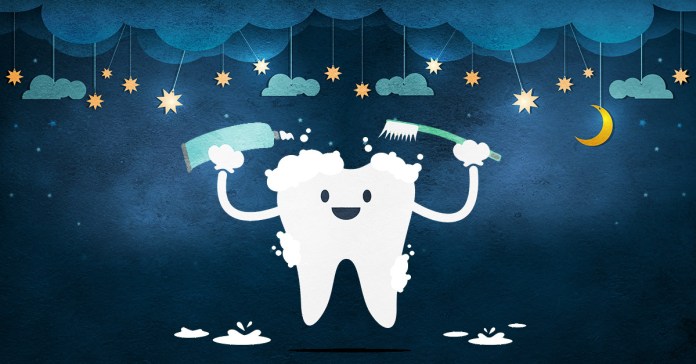No, it is not. But you probably already suspected that. You need to understand why.
Your mouth harbors 200 to 300 bacterial species. That may make you feel a tad bit “dirty,” but remember there’s a whole lot more in your gut.
The truth of the matter is that your body needs bacteria for a number of normal body processes like digestion. This just means that there is opportunity for harmful bacteria to thrive as well.
Cavities Are Formed By The Action Of Bacterial Acids
A limited number of bacterial species living in your mouth can cause cavities and gum disease. Here’s how it works:1
When you eat foods that contain carbohydrates – not just sugar or sweet treats but even rice, pasta, and potato – you are “feeding” the bacteria inside your mouth, both good and bad. Obtaining nourishment from remnant food particles stuck between your teeth, these bacteria multiply.

The bacterial colonies then mix with saliva to form a slimy layer of plaque on the surface of your teeth. If you run your tongue over your teeth just after you wake up in the morning, you will feel this slimy layer.
As bacteria form plaque, they produce acids. These acids can dissolve minerals from the hard tissue layers protecting your teeth, particularly the outermost layer called the enamel. This leads to tooth decay.
4 Pointers For Night-time Brushing
1. Don’t Leave Bacteria Undisturbed For 24 Hours

It takes about 24 hours for plaque to mature, which means you need to brush your teeth at least once a day (twice is even better!). This will deprive cavity-causing bacteria of time required to eat into your tooth enamel.
Plaque is treated like an infection by the body, so it triggers an inflammatory response. If plaque persists, over time this inflammatory response can cost your gums. It begins destroying tissues around your teeth, still trying to fight the infection but causing your gums to recede in the bargain. Bleeding, unhealthy gums are the result of it.
2. If It’s Once A Day, Make It Night

While it’s always recommended to brush your teeth twice a day, if you had to choose between morning and night, choose night.
Brushing in the morning is more of a fresh-breath stimulator than a fighting-off-bacteria measure. You usually brush before breakfast, don’t you? It is just to get rid of foul-smelling morning breath, a favor you owe to everyone you meet during the day.
On the other hand, night-time brushing is the real deal. While you sleep, your saliva production is significantly reduced. The dryness you feel in your mouth after a full night’s sleep is because of this. Saliva is your mouth’s natural antibiotic. A dry mouth is unable to defend itself from bacterial acids, leaving bacteria to their own devices all night long. Simply put – it is not good news for your teeth.
Because of this, brushing before you sleep is more important than the morning ritual.
3. Brush 30 Minutes After Dinner, Not Right Before Bed

How important is the “right before bed” clause? It is important but not rigid. What’s more important is that you give the fluoride in your toothpaste enough time before you sleep to protect your teeth from bacterial acids. Fluoride reduces your chances of developing cavities by 30%–50%.
So, it is better to brush your teeth between dinner and bedtime and not right before you hit the sack.
It is also advisable to wait for at least 30 minutes after dinner before you brush your teeth. Bacterial acid production peaks during dinner, leaving your tooth enamel most vulnerable during this time. Softened tooth enamel will not be able to withstand the strokes of your toothbrush if you brush immediately after eating.
4. Don’t Snack On Carbs All Day Long

You might not be doing it intentionally, but the chances that you are doing it nonetheless are high. Eating carbs (nothing but sugar) or sweetened dishes through the day will give your oral bacteria the nutrition they need to grow and multiply.
While it’s okay to eat carbs in your main meals (it is actually required for a balanced diet), refrain from munching on carb-rich snacks like white bread and doughnuts between meals.
Take control of your oral health. The least you can do for your pearly whites is to brush them every night. Your older self will thank you for it.
References





